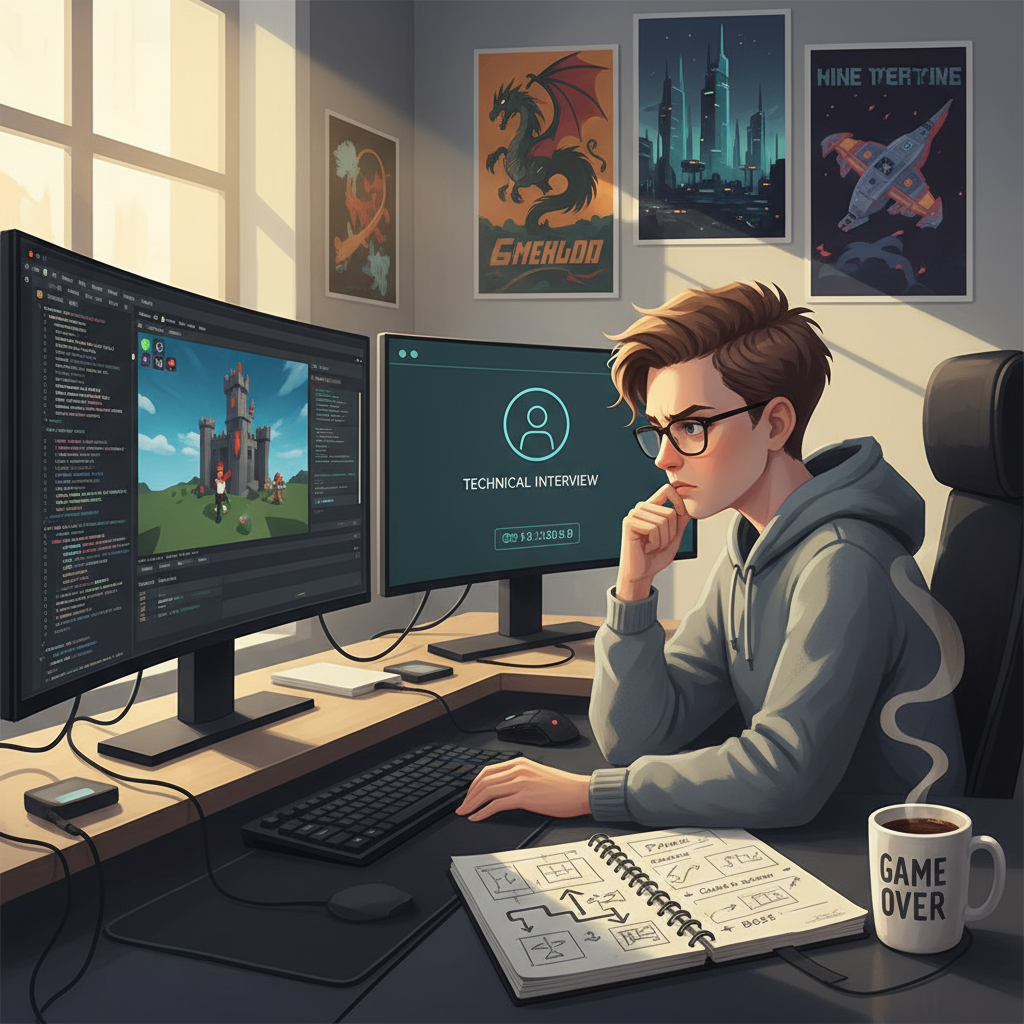Game Developer Interview Questions: Level Up Your Interview Skills (2025 Guide)


Ready to Land Your Dream Game Dev Job?
Practice unlimited game developer interviews, get instant AI feedback, and track your progress for free. Try Huru Now →

🎮 The Modern Game Developer Interview Landscape in 2025
In 2025, the game development industry is evolving faster than ever, requiring not only top-notch coding chops but also creative vision, collaboration skills, and adaptability to new technologies. Studios now seek candidates who demonstrate:
- Mastery of game engines like Unity and Unreal Engine
- Strong software architecture and optimization abilities
- Teamwork, communication, and resilience during high-pressure projects
- Passion for innovation—think AR/VR, procedural generation, and cloud gaming
Interviews are a blend of technical challenges, system design, and behavioral deep-dives. Let’s explore how to ace every facet—and why Huru.ai’s AI-powered platform is your secret weapon for interview mastery.
💡 Key Takeaway
Most competitor blogs overlook advanced topics like multiplayer systems, live ops, or AR/VR, and rarely offer tailored behavioral frameworks. We cover both—so you stand out!
🔍 Decoding the Interview: Key Technical & Behavioral Question Themes
Game developer interviews break down into two main categories—Technical and Behavioral:
| Category | Typical Questions |
|---|---|
| Game Engines | Which engines have you used? Why do you prefer one over another? |
| Mechanics Design | Describe a challenging mechanic you designed. How did you refine it? |
| Optimization | How do you optimize 3D models or cross-platform performance? |
| Coding | How would you implement dynamic stats, AI, or procedural content? |
| Debugging/QA | Walk me through your testing process. How do you prioritize bugs? |
| Teamwork | Describe a conflict in a team. How did you resolve it? |
| Growth & Learning | How do you stay updated with industry trends? |
Huru lets you simulate both technical and behavioral interviews, with instant feedback on your answers, body language, and communication style—so you can refine your approach for every interview type.
🛠️ Leveling Up: Sample Game Developer Interview Questions & Model Answers
Below are real-world examples—complete with expert-backed model answers and strategic breakdowns. Practice these with Huru’s AI-powered mock interviews to boost your confidence and polish your delivery!
- Q: Which game engines are you most proficient with, and why?
A: “I’m highly experienced with Unity due to its versatility for 2D/3D, prototyping speed, and C# scripting, but I’ve also shipped projects in Unreal for AAA visuals and Blueprint scripting. I decide based on platform, team familiarity, and performance target for each project.” - Q: Describe a system you designed that improved player engagement.
A: “On my last project, I introduced a dynamic quest generator using procedural content. After launch, we monitored player retention and iterated on quest variety using feedback and analytics.” - Q: How do you handle a drop in frame rate in a complex scene?
A: “My first step is profiling—identifying bottlenecks (CPU/GPU). I optimize draw calls, use object pooling, adjust LODs, and downgrade expensive shaders. I always document trade-offs for future team reference.” - Q: Tell me about a time you disagreed with a designer or artist. How did you resolve the conflict?
A: “I prioritize clear communication, asking for their perspective and explaining technical constraints. I propose alternatives, seek compromise, and focus on the player experience rather than personal opinions.” - Q: How do you stay updated with the latest game development trends?
A: “I follow GDC talks, participate in game jams, and am active in dev communities on Discord and Twitter/X. I set aside weekly learning time for new engine features and emerging tools.”
💡 Key Takeaway
Use specific, relevant examples from your portfolio. Huru lets you record and refine your STAR stories—so you never freeze, even on tough behavioral questions.
🚀 Advanced Topics: Stand Out with Next-Level Expertise
To outshine other candidates, demonstrate knowledge in emerging and advanced topics often missed by competitors:
- AI & procedural content generation
- Networking & multiplayer architecture
- Cloud gaming, live ops, and scaling
- Integrating AR/VR and cross-platform play
- Modern graphics pipelines (ray tracing, PBR, etc.)
Practice answering scenario-based questions like: “How would you architect a live event system for a cross-platform game?” or “Describe optimizing network code for low latency.”
For a deeper dive into technical interviews for related tech roles, check out our resources on Full Stack Developer Interview Questions and Frontend Developer Interview Questions.
💡 Key Takeaway
Studios love candidates who talk confidently about scaling games, multiplayer, and advanced graphics. Use Huru’s unlimited practice to tackle these questions out loud—before they’re asked for real!
🤖 How Huru.ai Elevates Your Interview Preparation
With Huru.ai, you can:
- Practice unlimited mock interviews for game dev roles, tailored to engines, platforms, and seniority
- Get instant feedback on every answer—covering content, fluency, eye contact, and body language
- Refine your portfolio pitch and STAR stories with actionable coaching
- Track progress over time—never guess if you’re improving
Level up your preparation with realistic simulations—perfect for technical, behavioral, and even tough leadership questions.
Ready to build unshakeable confidence? Sign up for free and start practicing with Huru.ai today!
For further interview insights, check our guide on Mobile App Developer Interview Questions and compare the game dev process with Full Stack Developer challenges.
🎥 In-Depth: Game Developer Interview Video Walkthrough
Want to see a real technical interview in action? Watch this detailed walkthrough for live strategies and expert tips:
Tip: Practice answering questions out loud as you watch, and note how body language and structure matter.
💡 Key Takeaway
Watching others succeed is a powerful tool. Combine video learning with Huru’s AI feedback for the ultimate preparation combo!
❓ Game Developer Interview FAQs: What Candidates Ask (and What Recruiters Look For)
Here are some of the most common—and most important—questions candidates have about the game developer interview process in 2025:
- How technical are the interviews?
Expect live coding, whiteboard problems, system design, and questions about shipped projects. Some studios use take-home tests or portfolio reviews. - Do interviews cover only engines and code?
No! Studios also probe teamwork, iteration, feedback handling, and your creative process—especially for senior roles. - What’s the best way to practice?
Simulate the interview experience with realistic questions, record yourself, and analyze your communication—just like Huru lets you do for free. - How do I stand out?
Showcase advanced skills (AI, multiplayer, live ops), use relevant portfolio examples, and always explain your problem-solving process. - Are behavioral interviews really that important?
Yes! Studios want team players who can learn, adapt, and handle feedback constructively.
For more preparation guidance, also see our Mobile App Developer Interview Questions Showcase Your Mobile Expertise.
💡 Key Takeaway
Preparation is everything. Use Huru for unlimited practice, tailored feedback, and interview analytics. Be the candidate every studio remembers!
About the Author
Elias Oconnor is a content writer at Huru.ai specializing in career tech for developers and creatives. He’s passionate about demystifying the hiring process and helping candidates build real, unshakeable confidence for interviews in the fast-evolving world of game development.


 Jul 07,2024
Jul 07,2024  By Elias Oconnor
By Elias Oconnor